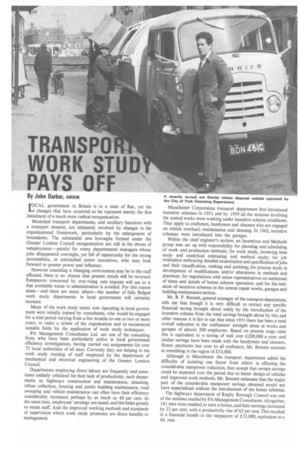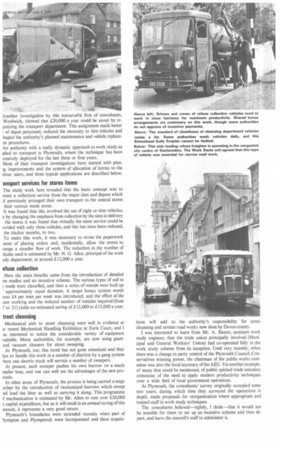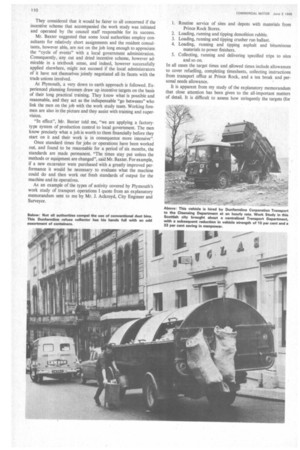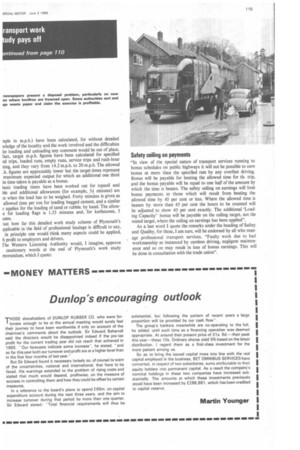TRANSPO WORK STUD PAYS OFF
Page 110

Page 111

Page 112

Page 117

If you've noticed an error in this article please click here to report it so we can fix it.
By John Darker, AMBIM -FOCAL government in Britain is in a state of flux, yet the 1.4 changes that have occurred so far represent merely the first instalment of a much more radical reorganization.
Municipal transport departments, and ancillary functions with a transport element, are intimately involved by changes in the organizational framework, particularly by the enlargement of boundaries. The substantial new boroughs formed under the Greater London Council reorganization are still in the throes of redeployment—painful for many departmental managers whose jobs disappeared overnight, yet full of opportunity for the strong personalities, or entrenched senior executives, who may look forward to greater power and influence.
However unsettling a changing environment may be to the staff affected, there is no chance that present trends will be reversed. Ratepayers concerned by ever-rising rate imposts will see to it that avoidable waste in administration is avoided. For this reason alone—and there are many others—the number of fully fledged work study departments in local government will certainly increase.
Many of the work study teams now operating in local government were initially trained by consultants, who would be engaged for a trial period varying from a few months to one or two or more years, to make a review of the organization and to recommend suitable fields for the application of work study techniques.
PA Management Consultants Ltd. are one of the consulting firms who have been particularly active in local government efficiency investigations, having carried out assignments for over 75 local authorities of all sizes. Currently they are helping in the work study training of staff employed by the department of mechanical and electrical engineering of the Greater London Council.
Departments employing direct labour are frequently and sometimes unfairly criticized for their lack of productivity; such departments as highways construction and maintenance, cleansing, refuse collection, housing and public building maintenance, road sweeping and vehicle maintenance can often have their efficiency considerably increased, perhaps by as much as 40 per cent. At the same time, employees' earnings are raised, and this helps greatly to retain staff. And the improved working methods and standards of supervision which work study promotes are direct benefits to management. Manchester Corporation transport department first introduced incentive schemes in 1951 and by 1959 all the sections involving the central works were working under incentive scheme conditions. They apply to craftsmen, handymen and cleaners who are engaged on vehicle overhaul, maintenance and cleaning. In 1962, incentive schemes were introduced into the garages.
Within the chief engineer's section, an Incentives and Methods group was set up with responsibility for planning and scheduling of work and production methods; for work study, involving time study and analytical estimating and method study; for job evaluation embracing detailed examination and specification ofjobs and their classification, ranking and pointing; for process study in development of modifications and/or alterations in methods and practices; for negotiations with union representatives on settlement of times and details of bonus scheme operation; and for the initiation of incentive schemes in the central repair works, garages and building maintenance section.
Mr. R. F. Bennett, general manager of the transport department, tells me that though it is very difficult to extract any specific financial saving brought about solely by the introduction of the incentive scheme from the total savings brought about by this and other reasons it is fair to say that since 1951 there has been a total overall reduction in the craftsmens' strength alone at works and garages of almost 300 employees. Based on present wage rates this is equivalent to a saving of well over £200,000 a year, and similar savings have been made with the handymen and cleaners. Bonus payments last year to all craftsmen, Mr. Bennett assesses at something in the region of £53,000.
Although in Manchester the transport department admit the difficulty of isolating one factor from others in effecting the considerable manpower reduction, they accept that certain savings could be expected over the period due to better design of vehicles and improved work methods. Mr. Bennett estimates that the major part of the considerable manpower savings obtained would not have materialized without the introduction of the bonus schemes.
The highways department of Rugby Borough Council was one of the sections studied by PA Management Consultants. Altogether, 181 men were enabled to earn a bonus, and their earnings increased by 22 per cent, with a productivity rise of 62 per cent. This resulted in a financial benefit to the ratepayers of £33,000, equivalent to a 4d. rate. Another investigation by this resourceful firm of consultants, Woolwich, showed that £20,000 a year could be saved by re;anizing the transport department. This assignment made better ; of depot personnel, reduced the necessity to hire vehicles and haped the authority's planned maintenance and vehicle replacent procedures.
An authority with a really dynamic approach to work study as plied to transport is Plymouth, where the technique has been :ensively deployed for the last three or four years.
Most of their transport investigations have started with planig improvements and the system of allocation of lorries to the rious users, and three typical applications are described below.
'ansport services for stores items
The study work here revealed that the basic concept was to erate a collection service from the major sites and depots which d previously arranged their own transport to the central stores their various needs arose.
It was found that this involved the use of eight or nine vehicles, it by changing the emphasis from collection by the sites to delivery • the stores it was found that virtually the same service could be ovided with only three vehicles, and this has since been reduced, the slacker months, to two.
To make this work, it was necessary to revise the paperwork stem of placing orders and, incidentally, allow the stores to range a steadier flow of work. The reduction in the number of hides used is estimated by Mr. N. G. Allen, principal of the work ady department, at around £12,000 a year.
efuse collection
Here the main benefits came from the introduction of detailed ne studies and an incentive scheme. The various types of call to made were classified, and then a series of rounds were built up approximately equal duration. A target bonus system worth out £4 per man per week was introduced, and the effect of the ster working and the reduced number of vehicles required (from 7 to 21) yields an estimated saving of £12,000 to £15,000 a year.
treet cleansing
Mechanical aids to street cleansing were well in evidence at ie recent Mechanical Handling Exhibition at Earls Court, and I as interested to notice the considerable variety of equipment vailable. Many authorities, for example, are now using giantzed vacuum cleaners for street sweeping.
At Plymouth, too, this trend has not gone unnoticed and they Ian to handle this work in a number of districts by a gang system there one electric truck will service a number of sweepers.
At present, each sweeper pushes his own barrow on a much mailer beat, and one can well see the advantages of the new proosals.
In other areas of Plymouth, the process is being carried a stage irther by the introduction of vacuumized barrows which sweep nd load the litter as well as carrying it along. This programme f mechanization is estimated by Mr. Allen to cost over £20,000
capital expenditure, but as it will result in an annual saving of this mount, it represents a very good return.
Plymouth's boundaries were extended recently when part of 'lympton and Plympstock were incorporated and these acquisi tions will add to the authority's responsibility for street cleansing and certain road works now done by Devon county.
I was interested to learn from Mr. A. Baxter, assistant work study engineer, that the trade union principally involved (Municipal and General Workers' Union) had co-operated fully in the work study scheme from its inception. Until very recently, when there was a change in party control of the Plymouth Council, Conservatives winning power, the chairman of the public works cornmitee was also the local secretary of the AEU. Yet another example. of many that could be mentioned, of public spirited trade unionists conscious of the need to apply modern productivity techniques over a wide field of local government operations.
At Plymouth, the consultants' survey originally occupied some two years, during which time they surveyed the operations in depth, made proposals for reorganization where appropriate and trained staff in work study techniques.
The consultants believed—rightly, I think—that it would not be sensible for them to set up an incentive scheme and then depart, and leave the council's staff to administer it. They considered that it would be fairer to all concerned if the incentive scheme that accompanied the work study was initiated and operated by the council staff responsible for its success.
Mr. Baxter suggested that some local authorities employ consultants for relatively short assignments and the resident consultants. however able, are not on the job long enough to appreciate the "cycle of events" with a local government administration. Consequently, any cut and dried incentive scheme, however admirable in a textbook sense, and indeed, however successfully applied elsewhere, might not succeed if the local administrators of it have not themselves jointly negotiated all its facets with the trade unions involved.
At Plymouth, a very down to earth approach is followed. Experienced planning foremen draw up incentive targets on the basis of their long practical training. They know what is possible and reasonable, and they act as the indispensable "go betweens" who link the men on the job with the work study team. Working foremen are also in the picture and they assist with training and supervision.
"In effect", Mr. Baxter told me, "we are applying a factorytype system of production control to local government. The men know precisely what a job is worth to them financially before they start on it and their work is in consequence more intensive".
Once standard times for jobs or operations have been worked out, and found to be reasonable for a period of six months, the standards are made permanent. "The times stay put unless the methods or equipment are changed", said Mr. Baxter. For example, if a new excavator were purchased with a greatly improved performance it would be necessary to evaluate what the machine could do and then work out fresh standards of output for the machine and its operatives.
As an example of the types of activity covered by Plymouth's work study of transport operations I quote from an explanatory memorandum sent to me by Mr. J. Ackroyd, City Engineer and Surveyor. I. Routine service of sites and depots with materials from Prince Rock Stores.
2. Loading, running and tipping demolition rubble.
3. Loading, running and tipping crusher run ballast.
4. Loading, running and tipping asphalt and bituminous materials to power finishers.
5. Collecting, running and delivering specified trips to sites and so on.
In all cases the target times and allowed times include allowances to cover refuelling, completing timesheets. collecting instructions from transport office at Prince Rock. and a tea break and personal needs allowance.
It is apparent from my study of the explanatory memorandum that close attention has been given to the all-important matters of detail. It is difficult to assess how stringently the targets (for nple in m.p.h.) have been calculated, for without detailed wledge of the locality and the work involved and the difficulties ite loading and unloading any comment would be out of place. Fact, target m.p.h. figures have been calculated for specified ad trips, loaded runs, empty runs, service trips and rush-hour ring, and they vary from 14.2 m.p.h. to 20 m.p.h. The allowed .h. figures are appreciably lower but the target times represent maximum expected output for which an additional one third he time taken is payable as a bonus.
lasic loading times have been worked out for topsoil and ble and additional allowances (for example, minutes) are :n when the load has to be weighed. Forty minutes is given as allowed time per ton for loading bagged cement, and a similar applies for the loading of sand or rubble. by hand. The allowe for loading flags is 1.33 minutes and, for kerbstones, 3 lutes.
ust how far this detailed work study scheme of Plymouth's pplicable in the field of professional haulage is difficult to say, in principle one would think many aspects could be applied, h profit to employers and drivers.
Ile Western Licensing Authority would, I imagine, approve cautionary words at the end of Plymouth's work study morandum, which I quote:
Safety ceiling on payments -In view of the special nature of transport services running to bonus schedules on public highways it will not be possible to earn bonus at more than the specified rate by any overfast driving. Bonus will be payable for beating the allowed time for th, trip, and the bonus payable will be equal to one half of the amount by which the time is beaten. The safety ceiling on earnings will limit bonus payments to those which will result from beating the allowed time by 45 per cent or less. Where the allowed time is beaten by more than 45 per cent the hours to be counted will be adjusted to show 45 per cent exactly. The additional 'Loading Capacity' bonus will be payable on the ceiling target. not the stated target, where the ceiling on earnings has been applied".
As a last word I quote the remarks under the heading of Safety and Quality, for these, I am sure, will be endorsed by all who manage professional transport services. "Faulty work due to bad workmanship as instanced by careless driving, negligent maintenance and so on may result in loss of bonus earnings. This will be done in consultation with the trade union".








































































































































































